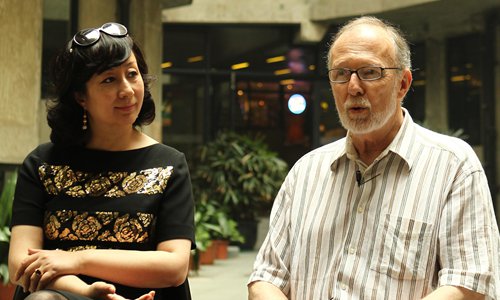ARTS / BOOKS
Chinese-Canadian writer commemorates Jewish refugees in Shanghai during WWII in 10-part novel series

Bei La and Howard Goldblatt Photo: Courtesy of Bei La
Filled with a mixture of dread and hope, two carriages of Jewish refugees set forth on a journey to Shanghai from Harbin, capital of Northeast China's Heilongjiang Province, in 1938.
This is how Chinese-Canadian writer Bei La, a former Shanghai native, begins the love story of a young Jewish man and a woman as they flee Nazi oppression during World War II in her newest book. The Chinese language Song of Survivors, which hit bookstores in China earlier this month, is the second novel of a planned 10-part series focusing on Jewish refugees who found sanctuary in China.
"They had faith in face of suffering and their love of Shanghai, which accepted around 30,000 Jewish refugees in the 1930s," Bei La told the Global Times.
"In general, sincerity, love and faith are what moves humankind," she added.
Urgent task
The hero and heroine in the novel are based on renowned US film producer Mike Medavoy's parents Michael and Dora Medavoy.
Bei La first met Mike Medavoy in 2011 when the Shanghai Film Group expressed interest in adapting her first novel in the series, A Jewish Piano, into a film.
Born to a Jewish family in Shanghai in 1941, Medavoy is one of Hollywood's most successful producers. Having helped produce numerous films such as Black Swan and Shutter Island, he won the Cannes Film Festival's Lifetime Achievement Award in 1998.
Bei La met Medavoy's mother a few times and listened to her stories about the family's life in Shanghai. Unfortunately, Dora Medavoy passed away right before Song of Survivors was published.
Bei La noted that she wants to publish more stories about the lives of the Jewish refugee community in Shanghai in the 1930s because as the years go on more and more of its members are passing away.
Bei La explained that she has worked on this project for 14 years and has sketched out the character relationships for all 10 books in the series. During her research, she has gathered numerous resources about the Jewish refugees in Shanghai at that time. She has interviewed former Jewish residents of the city and their descendents as well as poured over countless records in museums and libraries. Bei La told the Global Times that her notes on the subject have reached around 1.7 million words.
She said she plans to release the third novel in the series at the Shanghai Book Fair next year.
"There are some documentaries about Jewish refugees in Shanghai during the 1930s, but I think fiction novels are also needed because they are more touching," Bei La noted.
Long-lasting friendship
During the 1990s, the 20-something Bei La immigrated from China to Canada. She said she still remembers very clearly how earnest an old Jewish fur dealer in Toronto was when he heard that she came from Shanghai. The dealer kept talking about how the people in Shanghai protected them. This was the first time she had heard this story from someone from the Jewish community.
"Shanghai is an inclusive mega city. They may be frugal when it comes to their own needs, but they are especially generous to others, particularly foreigners," Bei La told the Global Times.
She learned from a friend whose neighbors were Jewish that Shanghainese offered the finest food in their home to the refugees during major festivals, but that not all their goodwill could be accepted. For example, they offered a dish of stewed pork with brown sauce to one family but the family politely declined. As time went on, local residents gradually came to understand and know more about the cultural differences between themselves and these new friends from afar.
"For example, the Jewish can only eat fish with scales," Bei La noted.
Bei La's series is being translated by Howard Goldblatt, the celebrated Jewish sinologist who has translated many of Chinese Nobel literature prize winner Mo Yan's works.
"I am only a starting writer, so I think the reason why a top Chinese-English translator like Goldblatt would agree to translate for me must come down to the cultural and historical background of the novels," Bei La said.
Mike Medavoy's father used to work at a telecom company while living in Shanghai. Bei La managed to locate the elder Medavoy's job application from local archives and showed it to Mike Medavoy when he came to Shanghai to attend the Shanghai International Film Festival in 2012.
"He was so excited to see his father's photo at the age of 20. In a very emotional speech on stage, he said that he feels he was able to see his father again in Shanghai," Bei La said.


